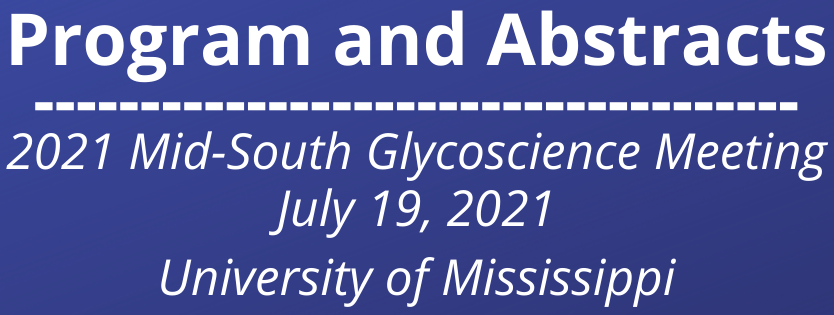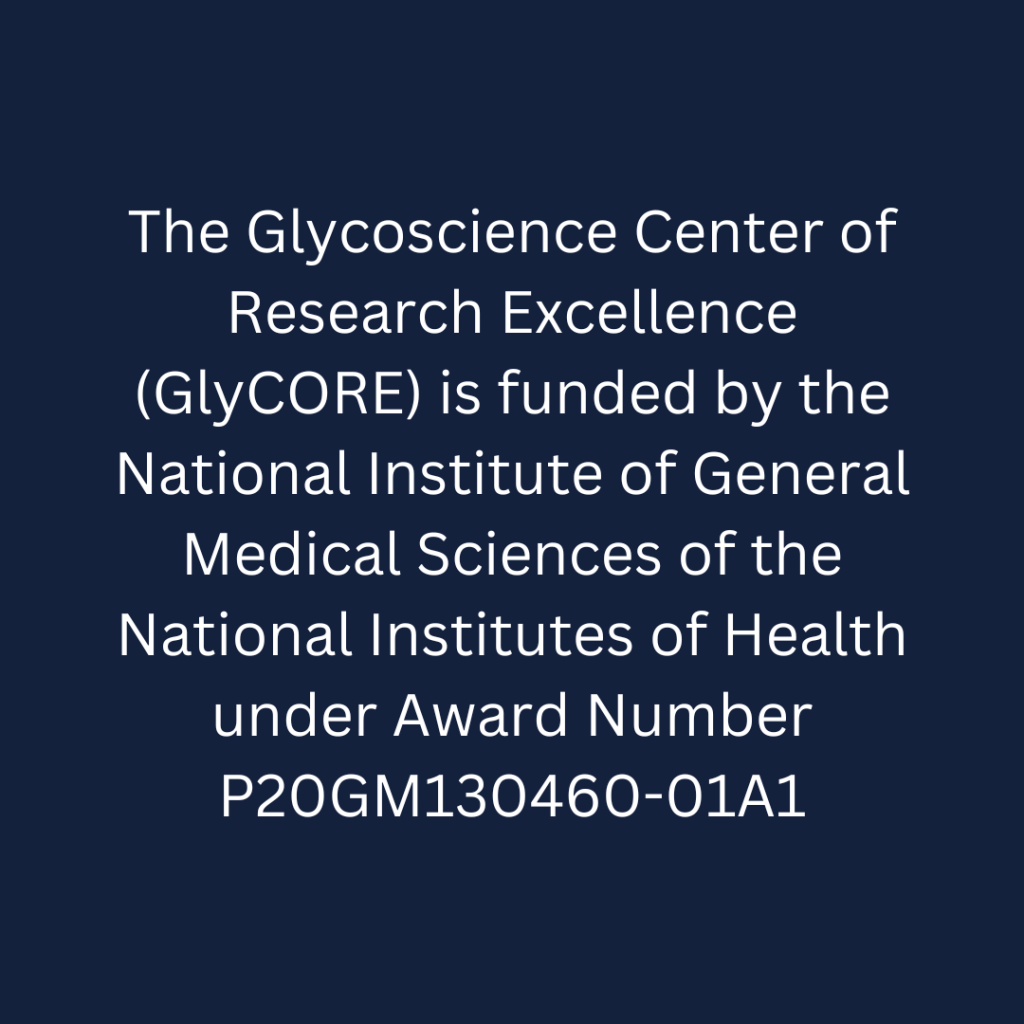2021 Mid-South Glycoscience Meeting
Monday, July 19, 2021
Thad Cochran Research Center
University of Mississippi, Oxford, Mississippi
On behalf of Prof. Samir Ross and the Core Directors of the Glycoscience Center of Research Excellence, I am delighted to welcome you to the inaugural Mid-South Glycoscience meeting at the University of Mississippi scheduled for July 19th, 2021 in Oxford, Mississippi. Glycoscience is a rapidly expanding field that intersects with virtually all areas of biomedical research. The unique challenges and rapidly developing tools used in modern glycoscience can make the field challenging for both new investigators and experienced hands. The Mid-South Glycoscience Meeting is dedicated to bringing together researchers from diverse disciplines across the Mid-South region to discuss issues in glycoscience, foster collaborations, and learn new techniques and technologies. For our inaugural conference, we have secured an exciting slate of invited speakers in carbohydrate chemistry, chemical biology, vertebrate glycobiology, and analytical glycoscience. This conference is meant to be an excellent opportunity for both experienced glycoscientists as well as biomedical researchers who are just entering the field to meet, discuss, and foster stronger ties. We welcome you to this conference and look forward to an exciting meeting.
Best regards,
Prof. Joshua Sharp, Director
Glycoscience Center of Research Excellence (GlyCORE)
University of Mississippi
Invited Speakers
Nancy Dahms, Medical College of Wisconsin: Biochemistry/Dahms
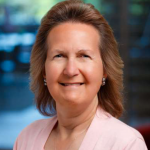
Dr. Dahms received her Bachelor of Science degree from Marquette University in 1980 and her Doctorate degree in Biochemistry from the Johns Hopkins University School of Medicine in 1986. She was a postdoctoral fellow at Washington University School of Medicine from 1986-1989 where she isolated and characterized the cDNA clones for the receptors involved in targeting lysosomal enzymes to the lysosome. She joined the faculty of the Medical College of Wisconsin in 1989. Research in the Dahms lab focuses on defining the molecular mechanism of receptor-mediated delivery of lysosomal enzymes to lysosomes, and thereby identify new strategies for the treatment of lysosomal storage diseases and other human diseases dependent upon lysosomal function.”
Linda C. Hsieh-Wilson, California Institute of Technology: Hsieh-Wilson Lab
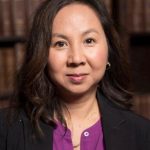
Research in the Hsieh-Wilson group combines organic chemistry and neurobiology to understand the molecular basis of fundamental brain processes. They apply the tools of organic synthesis, biochemistry, molecular and cellular biology, biophysics and neurobiology to manipulate and understand small molecules, proteins and molecular interactions critical for neuronal communication, development, learning and memory.
Steven D. Townsend, Vanderbilt University: Townsend Chemistry

Research in the Townsend lab focuses on developing new tools to broaden their fundamental understanding of chemistry while addressing problems significant to human health. To achieve this objective, they divide their efforts between two broadly defined areas, bio- and glycoconjugates assembly and natural product total synthesis. Since the goal is to interface synthetic efforts with issues of therapeutic application, they value interdisciplinary collaborations with biologists who aid in evaluation of the molecules they prepare. This approach, which is fostered by the Vanderbilt Institute of Chemical Biology, is a critical aspect of the program.
Charlie Fehl, Wayne State University: Fehl Lab
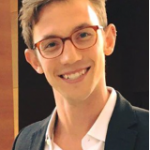
Charlie Fehl received a B.S. in Biochemistry from the University of Michigan in 2009 and a Ph.D. in Medicinal Chemistry from the University of Kansas in 2014. After conducting postdoctoral research at theUniversity of Oxford on protein modification methodology development, he opened his independent research lab at Wayne State University in 2018. The Fehl Lab builds chemically-controlled tools for O-GlcNAc glycobiology studies, and seeks to train a new generation of chemical biology innovators.
Maciej Walczak, University of Colorado, Boulder: Walczak Group
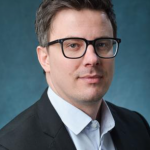
Maciej Walczak received his undergraduate degree (maxima cum laude) from Adam Mickiewicz University in Poznan, Poland. In 2003 he started his graduate studies at the University of Pittsburgh, where he worked on the synthesis and reactions of strained carbocycles. After graduating in 2009, he moved to New York as a Brodeur Foundation postdoctoral fellow at Memorial Sloan-Kettering Cancer Center, where he was involved in the synthesis of glycoproteins, anticancer vaccines, and antimetastatic agents. In August 2013 he started his independent career at the University of Colorado Boulder as an Assistant Professor of Chemistry and was promoted to Associate Professor in 2020.
